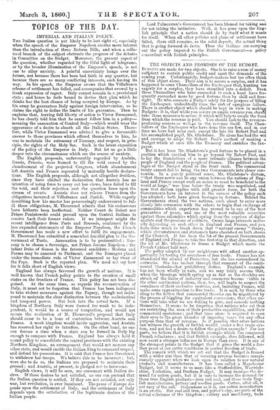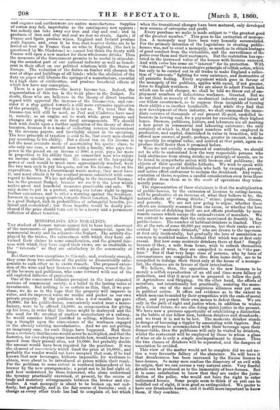THE OBJECTS AND PROMISES OF THE BUDGET.
BUDGETS are made for two objects. One is to raise a sum of money suf4cient to sustain public credit and meet the demands of the coming year. Unfortunately, budget-makers but too often think of this object alone. Their aim is to secure a surplus, and it has happened to some Chancellors of the Exchequer that, hunting too eagerly for a surplus, they have stumbled into a deficit. Even those Chancellors who have succeeded in such a hunt have fre- quently succeeded more by good fortune than by skill and fore- sight. He who concocts a Budget solely for the purpose of filling the Exchequer, undoubtedly runs the risk of egregious failure. There is another object which should be kept in view in making Budgets : it is, that while you secure an ample revenue you should take those measures to secure it which will help to create the fund from which the revenue is paid. You should look to the revenue- producing sources as \rains to the revenue itself. The Chan- cellors of the Exchequer who have done this are few, and in our time we have had none such except the late Sir Robert Peel and his accomplished pupil, Mr. Gladstone. He alone has had the wit and courage to adopt Sir Robert Peel's method of making a Budget which at once fills the Treasury and enriches the tax- payer.
But it has been Mr. Gladstone's good fortune to be placed in a position which enabled him to go beyond Sir Robert Peel, and to lay the foundations of a more intimate affiance between the people of England and the people of France. The political advan- tages of the Budget stand in the front rank. The commercial treaty cannot fail to bring the two Goveruments into closer con- nexion. In a purely political sense, Mr. Gladstone's dictum, "that there never can be any union between the nations of Eng- land and France except such an union as must be beneficial to the world at large," was true before the treaty was negotiated, and now that dictum applies with still greater force, for both the Governments have an interest in the success of the policy each has adopted ; both. have given hostages to fortune. Behind the Governments stand the two nations, each about to enter more closely into connexion with the other; to begin that exchange of commodities which experience has proved to be one of the best guarantees of peace, and one of the most valuable securities against those calamities which spring from the caprices of diplo- matists and the passions of cabinets. Create large interests mutu- ally depending on each other in England and France, and you have done much to break down that "natural enemy " theory, which circumstances and statesmen have cheiished on both shores of the Channel. It has been the lot of the present Governments of England and France to take the first step in that direction, and the lot of Mr. Gladstone to frame a Budget which meets the French Cabinet half way.
The policy adopted by our neighbours will afford another op- portunity 'for testing the soundness of free trade. France has not abandoned the citadel of Protection, but she has surrendered its outworks. She has broken through that remnant of the conti- nental blockade—her prohibitory duties. England's example has not been wholly in vain, and we may fairly assume that, when the blessings which spring up as fast as the shackles are struck off the limbs of industry and commerce become visible to the other continental nations, they, too, will begin to suspect the soundness of their exclusive systems, and, imitating France, will make some approximation to free trade. It is said, by those who cling to the notion that commercial theories can be negotiated by the process of higgling for equivalent concessions, that other na- tions will take what we are willing to give, and concede nothing themselves. It seems to be forgotten that nations who act thus are restricting the area of their productive capabilities, and their commercial operations ; and that time alone is required to open their eyes to the great blunder of imposing taxes for any other purpose than that of revenue. Is it possible that other nations can witness the growth of British wealth under a free trade sys- tem, and not feel a desire to follow the golden example ? For our parts, we believe that it is British example which has conquered French reluctance ; and that British example, thus followed, will now exert a stronger influence in Europe than ever. It is one of the strongest points in the Budget that it gives the world a fur- ther proof of our entire confidence in perfect freedom of trade. The remark with which we set out that the Budget is framed with a wider aim than that of securing revenue becomes conspi- cuously apparent when we look upon its relation to our natural products and manufactures. It has been called a Manchester Budget, but it seems to us more like a Staffordshire, Warwick- shire, Yorkshire, and Durham Budget. It may increase the de- mand for cotton goods, but it is sure to increase the demand for those true English products—iron and coal, and those truly Eng- lish manufactures, pottery and woollen goods. Cotton, after all, is not racy of the soil. Stupendous as it is, our cotton manufacture is an exotic. But coal and iron, and potter's clay, are parts of the actual substance of the kingdom ; cutlery and machinery, tools and engines and earthenware are native manufactures. Supplies of cotton may fail, improbable as the contingency now appears ; but nobody can take away our iron and clay and coal ; and in products of iron and clay and coal we fear no rivals. Again ; if France and Spain produce wines, England and Ireland produce malt liquors, and, even it be true that heavier duties are to be levied on beer in France than on wine in England, (the fact is questioned by Mr. Gladstone) we cannot but think the treaty with France will open a new market for these wholesome drinks. Thus the measures of the Government promise to be useful in stimulat- ing the soundest part of our national industry as well as benefi- cent in their effect on our political relations with the States of Europe. The reduction of the duties on timber will cheapen the cost of ships and buildings of all kinds; while the abolition of the duty on paper will liberate the springs of a manufacture, essential to a high state of civilization, and produce beneficial effects of which few have any conception.
There is a per contra—the heavy Income- tax. Indeed, the augmentation of this tax is the weak place in the Budget. No doubt, those who are believers in the theory of direct taxation regard with approval the increase of the Income-tax, and con- sider it a step gained towards a still more extensive application of the principle. We trust that it is not so. We trust that the Income-tax will still be used, as Peel and Gladstone have used it, namely, as an engine set to work while great repairs and changes are going on in our fiscal arrangements. We should look with doubt upon a further application of the theory of direct taxation, because it is a mode of collecting revenue inconvenient to the revenue payers, and inevitably unjust in its operation. The true principle of taxation is said to be, that every man should pay according to his ability. But a direct tax on his income is not the most accurate mode of ascertaining his quota ; since, to cite only one case, a married man with a family, who pays ten- pence in the pound on an income of 500/. a year, pays far more in proportion to his ability than an unmarried man who enjoys an income similar in amount. The measure of the tax-paying power of each would be much more approximately reached, were the two men each to pay his quota, not on his income, but on his expenditure. When a Government wants money, they must have it, and must obtain it by the readiest process consistent with some regard to fairness. We are not objecting to the increased Income- tax in the present Budget, because we see it is the lever which makes great and beneficial measures practicable and safe. We only desire to put in a protest, saving our future right to oppose further extensions, and to utter a warning against the tendency, foreseen in so many quarters, towards direct taxation. The Budget is a good Budget, rich in probabilities of substantial benefits, po- litical and economical ; but these benefits would be dearly pur- chased if the price should turn out to be a heavy and a permanent infliction of direct taxation.



























 Previous page
Previous page